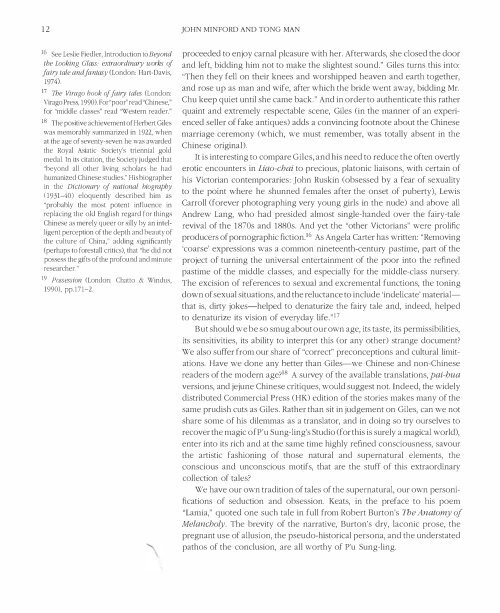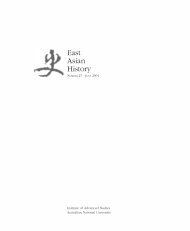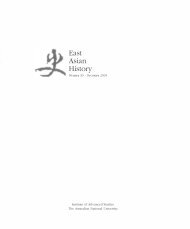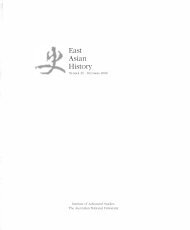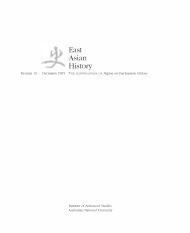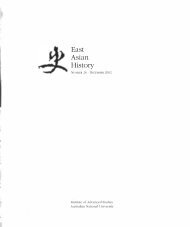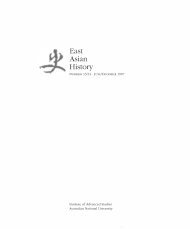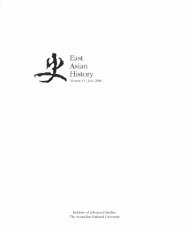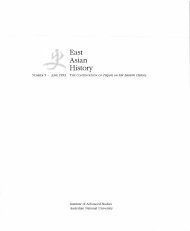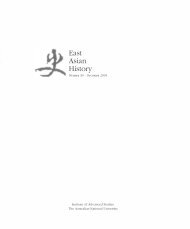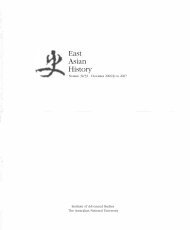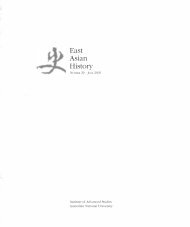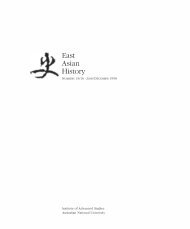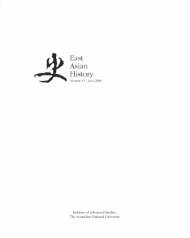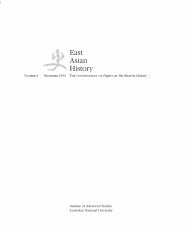Whose Strange Stories? P'u Sung-ling (1640 - East Asian History
Whose Strange Stories? P'u Sung-ling (1640 - East Asian History
Whose Strange Stories? P'u Sung-ling (1640 - East Asian History
You also want an ePaper? Increase the reach of your titles
YUMPU automatically turns print PDFs into web optimized ePapers that Google loves.
12<br />
16 See Leslie Fiedler, Introduction to Beyond<br />
the Looking Glass: extraordinary works of<br />
fa iry tale andfantasy (London: Hart-Davis,<br />
1974)<br />
17 The Virago book of fa iry tales (London:<br />
Virago Press, 1990). For "poor" read "Chinese,"<br />
for "middle classes" read "Western reader."<br />
18 The positive achievement of Herbert Giles<br />
was memorably summarized in 1922, when<br />
at the age of seventy-seven he was awarded<br />
the Royal Asiatic Society's triennial gold<br />
medal. Tn its citation, the Society judged that<br />
"beyond all other living scholars he had<br />
humanized Chinese studies." His biographer<br />
in the Dictionary of national biography<br />
0931-40) eloquently described him as<br />
"probably the most potent influence in<br />
replacing the old English regard for things<br />
Chinese as merely queer or silly by an intelligent<br />
perception of the depth and beauty of<br />
the culture of China," adding significantly<br />
(perhaps to forestall critics), that "he did not<br />
possess the gifts of the profound and minute<br />
researcher. "<br />
!9 Possession (London: Charto & Wind us,<br />
1990), pp.171-2.<br />
JOHN MINFORD AND TONG MAN<br />
proceeded to enjoy carnal pleasure with her. Afterwards, she closed the door<br />
and left, bidding him not to make the slightest sound." Giles turns this into:<br />
"Then they fell on their knees and worshipped heaven and earth together,<br />
and rose up as man and wife, after which the bride went away, bidding Mr.<br />
Chu keep quiet until she came back." And in order to authenticate this rather<br />
quaint and extremely respectable scene, Giles (in the manner of an experienced<br />
seller of fake antiques) adds a convincing footnote about the Chinese<br />
marriage ceremony (which, we must remember, was totally absent in the<br />
Chinese original).<br />
It is interesting to compare Giles, and his need to reduce the often overtly<br />
erotic encounters in Liao-chai to precious, platonic liaisons, with certain of<br />
his Victorian contemporaries: John Ruskin (obsessed by a fear of sexuality<br />
to the point where he shunned females after the onset of puberty), Lewis<br />
Carroll (forever photographing very young girls in the nude) and above all<br />
Andrew Lang, who had presided almost single-handed over the fairy-tale<br />
revival of the 1870s and 1880s. And yet the "other Victorians" were prolific<br />
producers of pornographic fiction.!6 As Angela Carter has written: "Removing<br />
'coarse' expressions was a common nineteenth-centUlY pastime, part of the<br />
project of turning the universal entertainment of the poor into the refined<br />
pastime of the middle classes, and especially for the middle-class nursery.<br />
The excision of references to sexual and excremental functions, the toning<br />
down of sexual situations, and the reluctance to include 'indelicate' materialthat<br />
is, dirty jokes-helped to denaturize the fairy tale and, indeed, helped<br />
to denaturize its vision of everyday life."!7<br />
But should we be so smug about our own age, its taste, its permissibilities,<br />
its sensitivities, its ability to interpret this (or any other) strange document?<br />
We also suffer from our share of "correct" preconceptions and cultural limitations.<br />
Have we done any better than Giles-we Chinese and non-Chinese<br />
readers of the modern age?18 A survey of the available translations, pai-hua<br />
versions, and jejune Chinese critiques, would suggest not. Indeed, the widely<br />
distributed Commercial Press (HK) edition of the stories makes many of the<br />
same prudish cuts as Giles. Rather than sit in judgement on Giles, can we not<br />
share some of his dilemmas as a translator, and in doing so try ourselves to<br />
recover the magic of<strong>P'u</strong> <strong>Sung</strong>-<strong>ling</strong>'s Studio (for this is surely a magical world),<br />
enter into its rich and at the same time highly refined consciousness, savour<br />
the artistic fashioning of those natural and supernatural elements, the<br />
conscious and unconscious motifs, that are the stuff of this extraordinary<br />
collection of tales?<br />
We have our own tradition of tales of the supernatural, our own personifications<br />
of seduction and obsession. Keats, in the preface to his poem<br />
"Lamia," quoted one such tale in full from Robert Burton's The Anatomy of<br />
Melancholy. The brevity of the narrative, Burton's dry, laconic prose, the<br />
pregnant use of allusion, the pseudo-historical persona, and the understated<br />
pathos of the conclusion, are all worthy of <strong>P'u</strong> <strong>Sung</strong>-<strong>ling</strong>.


